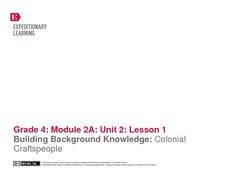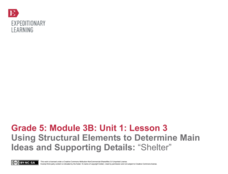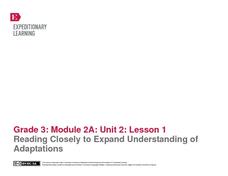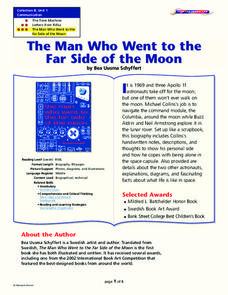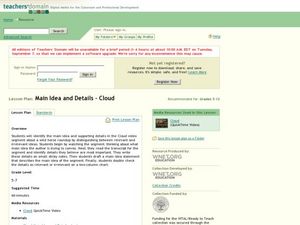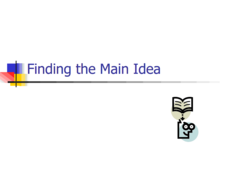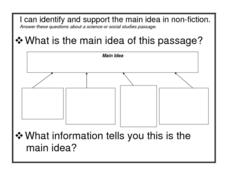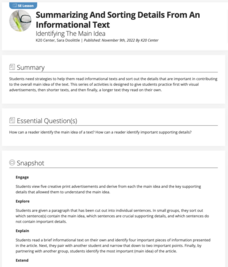Bright Hub Education
Using Evidence and Supporting Details in Writing
In expository writing, it is important to back up claims with evidence and details. Help your class to develop their writing with notes on different types of evidence. Once they have the basics down, practice with a sample thesis and...
EngageNY
Mid-Unit Assessment: Close Reading of Bullfrog at Magnolia Circle: Bullfrog Life Cycle
The sixth lesson plan in this Bullfrog at Magnolia Circle unit assesses your third graders' ability to read and understand informational text. The included assessment asks learners to take notes about the main idea and supporting details...
EngageNY
Building Background Knowledge: Colonial Craftspeople
In the first lesson plan of this unit on colonial trade, fourth graders gain background knowledge of different jobs performed by early colonists. The class begins with a slide show presentation that includes a variety of great...
Curated OER
Paragraphs: Main Idea and Supporting Details
This is a great way to review the concept of main idea and supporting details with younger learners. Learners read two short passages and identify the main idea and supporting details using visual prompts and a graphic organizer.
Clever Student Training Company
Analyzing the Essay
The skill set required of readers of informational text includes the ability to identify an article’s thesis or main idea, as well as the supporting points. Learners can practice these skills by analyzing an essay about the treatment of...
Curated OER
Using Details from the Text
Explore non-fiction comprehension strategies with your class. They will visualize daily activities and label a 4 circle Venn diagram with related phrases. They must identify the overlapping sections as "main ideas," then complete a...
Curated OER
Finding the Main Idea: 20,000 Leagues Under the Sea
An excerpt from Jules Verne's 20,000 Leagues Under the Sea provides learners with an opportunity to practice their ability to identify the main idea and supporting details in a passage. The beautifully illustrated learning exercise also...
EngageNY
Using Structural Elements to Determine Main Ideas and Supporting Details: “Shelter”
Does the picture tell the story? Learners continue their work in The Inuit Thought of It by creating a visual gist of pages 16 and 17. They then complete a main idea graphic organizer and discuss key supporting details.
Saddleback College
How to Find the Main Idea
What's the difference between the main idea of a text and the topic? Take kids through the process of literary analysis with a presentation about finding the main idea and supporting details. Additionally, it guides learners through...
EngageNY
Reading Closely to Expand Understanding of Adaptations
Third graders work to determine the main idea, recall key details, and answer questions using an informational text on the topic of animal adaptations. Using the non-fiction text "Staying Alive: Animal Adaptations" (provided) the teacher...
Curated OER
Juan Verdades
Cement comprehension skills using the strategies in this activity. After reading the story, Juan Verdades by Joe Hays, learners use context clues to answer questions, identify main ideas and details, and sequence events.
Curated OER
The Man Who Went to the Far Side of the Moon
Practice comprehension skills using the story, The Man Who Went to the Far Side of the Moon by Bea Uusma Schyffert. Learners answer questions, fill out graphic organizers, and engage in extension activities involving writing and...
Curated OER
Using a Title to Determine Main Idea (Nonfiction)
Young readers explore a nonfiction text for its main idea. They will listen to the book Animal Sight by Kirsten Hall, and then observe as the teacher models a main idea think-aloud. Later, for independent practice, they listen to the...
Tallahassee Community College
Finding the Main Idea
A short excerpt at the beginning of the sheet provides students with questions to think about when looking for the main idea. Followed by that, learners respond to four reading passages by answering multiple choice questions.
Curated OER
Finding the Main Idea: The Storm
Readers analyze a brief excerpt describing a storm, then choose the most applicable from four main ideas. They jot down three details from the story in three boxes. The excerpt isn't anything special; however, for a quick practice with...
Curated OER
Spinelli's Maniac Magee (excerpt): Reading and Critical Thinking Practice
A brief, dialogue-rich passage from Jerry Spinelli's novel Maniac Magee is accompanied by a well-written literacy assessment tool. Thematic content lends itself to age-appropriate discussions about race relations and social justice....
Do2Learn
Umbrella Organizer Frames
Being able to identify the details that support a main idea is an important skill. Have your pupils practice with this graphic organizer, which includes space for a main idea, three supporting details, and a final conclusion.
Curated OER
Main Idea and Details-Cloud
Students distinguish between main idea and details. In this writing process lesson, students use a video on horses to learn about note-taking. They write details from the video on sticky notes, and then determine which ones are most...
Curated OER
Finding the Main Idea
Being able to identify the main idea in a text is an essential comprehension skill. After the term is defined, viewers examine a series of paragraphs and are asked to identify the main idea and the supporting details.
Curated OER
Comprehension: Identify the Main Idea from Text
Children in first grade listen and read along with the teacher to practice main idea identification. They use the provided reading passages to read, locate the main idea and supporting details. This is a fully scripted lesson which means...
Polk Bros Foundation
I Can Identify and Support the Main Idea in Non-Ficiton
Analyze a historical or scientific informational text by determining the main idea and supporting details. This graphic organizer allows pupils to write down the main idea and four details.
Polk Bros Foundation
A Way to Analyze Paragraphs to Figure Out the Main Idea of a Nonfiction Text
Shrink up a section by asking pupils to write down the main idea for each of seven paragraphs. There is a space provided for each main idea. When students have completed this portion, they write down what they think to be the central...
K20 LEARN
Summarizing and Sorting Details from an Informational Text: Identifying the Main Idea
Scholars participate in two activities that teach them to identify the main idea and key supporting details in informational text. Partners create a visual that reflects the main idea and key supporting details in an informational text...
EngageNY
Analyzing the Main Idea in Video: Understanding the Limbic System
It's time to put on those thinking caps and analyze the brain! Pupils watch a video about teenage brain development, using a note-catcher to capture their thoughts about the main idea. Finally, they select two pieces of information from...




